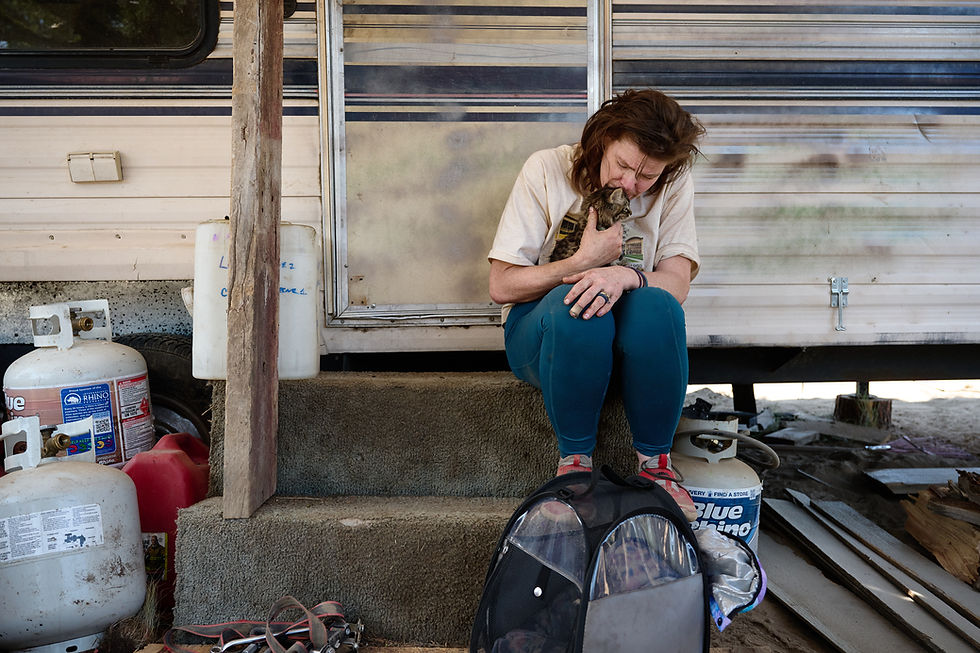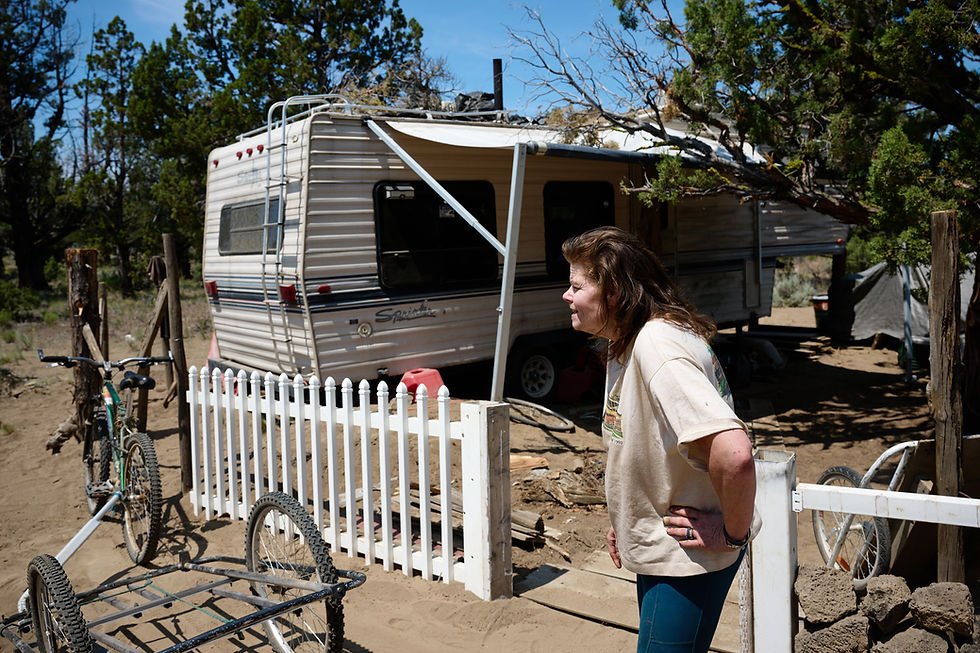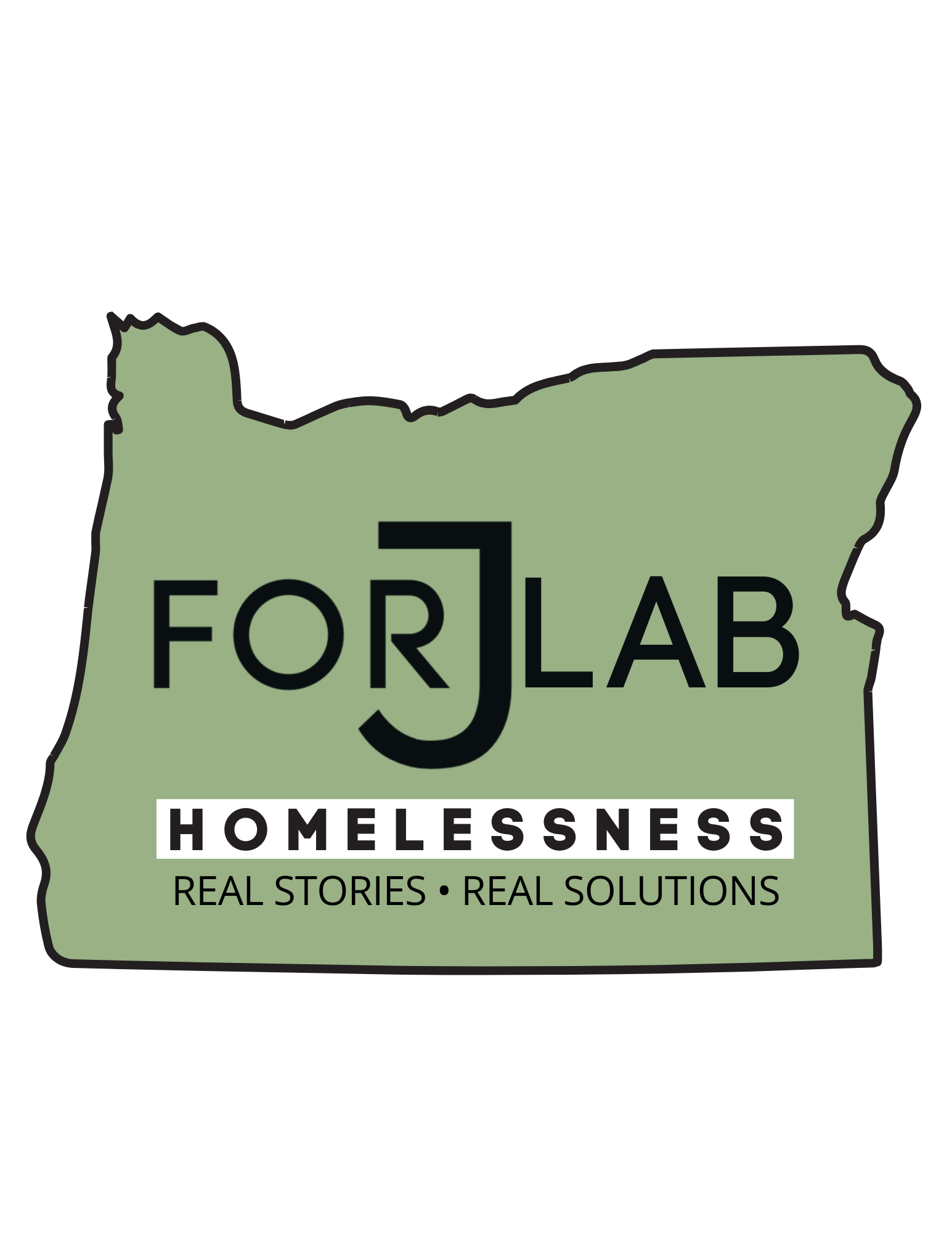Bend couple wrestle with homelessness, addiction amid treatment shortage
- Homelessness: Real Stories, Real Solutions

- Sep 30, 2025
- 6 min read
Christine Greene says she and her partner, Levi, are unhoused and caught in a cycle of despair. Studies show that Oregon is among the nation's worst in access to treatment, which exacerbates the challenges that come with homelessness.

By DAVID DUDLEY
At first glance, Christine Greene would appear to be living a version of the American Dream. She lives in a camper trailer with her partner, a dog, a pair of kittens and a toad. A white picket fence marks the boundary between their yard and the desert that surrounds it. Greene is friendly with her neighbors.
"This is our little piece of paradise," Greene said, taking a seat on the steps that lead to her front door.
Greene's camper was parked on Bureau of Land Management (BLM) land when she spoke with FORJournalism. Since then, Greene, 48, was ordered to move by BLM law enforcement officers.
That would mark the third time Greene, her partner, Levi, and their four-legged companions were compelled to move since May. Before that, Greene lived near China Hat Road. She was one of hundreds of campers who were made to leave the land by the U.S. Forest Service.
Greene moved to Rickard Road, but sheriff's deputies showed up shortly after they arrived, ordering them to move again. Then, they moved to the remote desert east of Bend.
"It's hard," Greene said, looking at the juniper tree that provides shade for her front yard. "We don't know where we'll go, don't know where to get help."
Greene and her partner, Levi, are among an estimated 342,000 Americans who currently live in their RVs. Greene said that there are many reasons she lives in her fifth-wheel camper, but it all boils down to lack of money.
It's Only Got Worse

In the Homeless Leadership Coalition's most recent Point-in-Time count, which records the number of unhoused people on a single night in Central Oregon, 64% of respondents cited economic factors as the reason they'd become homeless.
Even as new, affordable complexes like the College View Apartments, a collaboration between Housing Works and Rooted Homes, come online, affordable housing in Bend remains elusive. A two-bedroom apartment in that complex will cost $1,025, but the average cost for a two-bedroom apartment in Bend is currently $2,195, according to ZillowRentals.
Greene was born in Portland. A premature baby who weighed just four pounds at birth, Doctors told Greene's parents it would be a miracle if she survived.
"But I did," said Greene. "I don't know how, but I'm still here."
Greene has worked various food service jobs, from nursing homes to plants that produce bread and dairy products. She moved to Bend in 2015 to care for her stepmom, who was struggling with kidney failure. Greene lived with her stepmom until the latter died in 2016.
"I've been homeless ever since," said Greene. "I just couldn't afford to rent anything in the area. And it's only got worse."
Because of that, Greene has lived in the streets and various shelters. While it's hard to pin down employment numbers for unhoused people, the authors of a 2021 study from the University of Chicago found that 53% of people living in shelters, and 40% of unsheltered people, had jobs between 2011 and 2018.
Neither Greene nor Levi currently work. Greene said she wants to work, but suffers from a degenerative disease in her lower back, arthritis in her knees, and migraines.
"I'd like to try to get a work-from-home job," said Greene. "But we don't have a home, or reliable internet service."
However, in the years since the pandemic, even those with jobs are struggling to keep up with the cost of living. Workers in Oregon need to earn at least $33 an hour to be able to afford a two-bedroom apartment, according to the National Low Income Housing Coalition.
Always on the Move
While low income and a lack of affordable housing are the leading causes of homelessness, there’s a small percentage of unhoused people who self-reported substance abuse as the reason they are homeless, according to the Homeless Leadership Coalition's Point-in-Time count. For those individuals, it’s challenging to find treatment services or any other support to end their addiction, particularly in Oregon.

Greene and Levi are two among thousands of Oregonians who are grappling with substance use disorder, but treatment options are increasingly hard to come by.
"I also struggle with severe anxiety and depression," Greene said. "That's at least part of why I use drugs.
"I don't really like to talk about it," Greene continued, "but we occasionally use meth."
Oregon led the nation in methamphetamine (1.93% of the population) and opioid misuse (4.46% of the population), according to the National Survey on Drug Use and Health.
The Oregon Alcohol and Drug Policy Commission found that demand for addiction services exceeds access by 49%. Services are even more scarce in rural areas, like those surrounding Bend, and Greene doesn't own a car.
"I've never even had a driver's license," she said.
As Greene and Levi move from one camp to the next, health care providers have trouble finding them, which makes it harder to access treatment—and stick to it.
Misconceptions
Sierra Groenewold is the Behavioral Health Manager at Mosaic Community Health. She's also a medication-assisted treatment specialist with expertise in substance use disorder. She said that there are only 12 detox beds for the entire tri-county area — Deschutes, Jefferson and Crook counties — which is woefully inadequate to address the needs of those wrestling with substance use disorder.
Along with Mosaic's Street Medicine Team, Groenewold travels to the Temporary Safe Stay Area at Juniper Ridge each week to meet unhoused people where they are.
"The important thing to know about drug use among unhoused people, is that it's often a coping mechanism," Groenewold said. "Many unhoused people will use meth, or some other stimulant, to stay awake overnight to protect themselves and their belongings. It's not a moral failure, it's a survival tactic."

Groenewold said that there's a misconception that drug use is the primary cause of homelessness.
"It's much more complex than the stereotypes," she said. "Many of these people are dealing with the generational trauma that comes with poverty. When taken with the affordable housing shortage and the lack of treatment options, we start to see a clearer picture of a multi-layered problem."
While access to more treatment options are a necessary step toward addressing substance use disorder, Groenewold said part of the solution begins with the way people treat one another at home and in the streets.
"First, we need to destigmatize substance use," she said. "There's so much societal pressure, so much shame. Instead of judging people, we need to be more curious."
Then, she added, the community needs to address the affordable housing shortage. Studies show that access to recovery housing, like River Haven, a 70-room transitional housing complex in Portland, and permanent supportive housing similar to Cleveland Commons, in Bend, lead to decreased substance use over time.
"It's hard to abstain from drug use when, even if someone receives treatment, they return to the same environment they were in before," Groenewold said. "Sustainable, affordable housing options are a necessary step in the treatment process."
Until Then
Greene knows firsthand that using drugs has become increasingly precarious, dangerous. As Fentanyl flooded U.S. streets, it's been added to meth, heroin, and a slew of other drugs, making it harder for users to avoid the potent synthetic opioid. Fentanyl can be 100 times more potent than morphine, and 50 times more potent than heroin, which has led to spikes in overdose deaths, according to information provided by the U.S. Drug Enforcement Agency.
In June of 2024, while living in the woods near China Hat Road, Greene said she overdosed on Fentanyl. That's when she met Levi.
"I was on my deathbed for three days," she said, raising her chin toward her partner, who was playing in the yard with their dog, Pip. "He stayed by my side and cared for me until I rose from the dead. That's how I knew he's the one."
Greene said she didn't go to the hospital. Instead, Levi kept a cold washcloth on her forehead. He gave her plenty of fluids. And he talked to her consistently to keep her awake.
"We feel bad because we're homeless," she said. "So, we use drugs. Using drugs keeps us homeless, and the cycle continues."
While Greene knows that escaping the cycle will be difficult, increased access to services that can help her find a home, and treatment, would at least give her a chance.
"It's hard to get help when we keep having to move," Greene said. "I feel like, if we could just get into an apartment, we may be able to turn things around."
Homelessness: Real Stories, Real Solutions (realstoriesrealsolutions.org) is a journalism lab funded by Central Oregon Health Council under FORJournalism (forjournalism.org), an Oregon nonprofit dedicated to supporting journalism statewide. Sign up for weekly newsletters to receive updates.










Comments